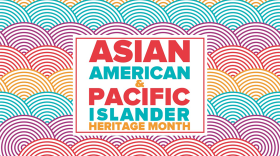The FBI says hate crimes against Asian Americans have increased 73%. In the last two years, that's compared to a 13% increase in hate crimes overall.
And in January, the White House released its first ever national strategy to address several major issues in the Asian American Native Hawaiian and Pacific Islander (AANHPI) communities, including combating anti-Asian hate.
State of Nevada producer Lorraine Blanco Moss talked with Mark Padoongpatt, the director of UNLV's Asian and Asian American studies program about that federal strategy and what more is needed.
According to a Pew Research Center study, one in five Asian Americans say they worry daily that they might be threatened or attacked because of their race or ethnicity. About one-third of AANHPIs have changed their daily routine because of those fears.
So how do we move forward? The national strategy to advance equity, justice and opportunities for Asian American Native Hawaiian and Pacific Islander communities is the first of its kind. It’s a detailed document offering a multi-agency approach, including 32 federal agencies and all 15 executive departments of the president’s cabinet.
Padoongpatt said some of it surprised him and some of it didn’t.
“I thought it was a good thing to see the centering of Native Hawaiian Pacific Islander issues. I think that is something that comes out of these conversations and debates that have been happening around what is the AAPI umbrella, and are Pacific Islander issues being ignored and masked under this umbrella,” he said. “I liked that the report mentions data disaggregation, but also in a way that highlights that Asian Americans and Native Hawaiian and Pacific Islanders also have a high concentration of poverty.”
He said while President Joe Biden’s is the first of its kind, it’s not the first attempt at this kind of help for the AANHPI communities. President Bill Clinton also signed an initiative while he was in office to support AANHPIs.
“They had something called a ‘missing in history’ aspect to that initiative where they wanted to document and tell and amplify Asian American history. And I wish I would have seen that in the report this time.”
In the data of the report, it’s noted 12% of hate crimes against Asian Americans were violent attacks. The rest included verbal harassment and other kinds of slights.
Disaggregation is also one of the major highlights in the administration’s new national strategy. Padoongpatt explained how important it is to reveal the nuances in statistics to break down the diversity of AANHPI communities:
“As you break it down, what you begin to see are some of the complexities and national differences, you start to see that Southeast Asian, and Southeast Asian refugees face different barriers, and are impacted in different ways than newly-arrived Chinese or Chinese Americans who have been here for four or five generations,” he said. “And if you look at Las Vegas, just as an example of how important this can be … the graduation rates, high school graduation rates between Vietnamese and Japanese Americans, there's a gap there. And then you compare that to Native Hawaiians. And this was from an American Community Survey in 2010, so there's gotta be more recent numbers. Native Hawaiian high school graduation rate was like 12% in Las Vegas, can we use that information? And that's the key, right? We can call for disaggregation. But what are we going to do with that information?”
He said he’ll wait and see what happens with the strategy.
“I do see some good talking points in the initiative that speaks to key debates that are happening in the field that are happening within the community.”
Guest: Mark Padoongpatt, Ph.D., director, Asian and Asian American Studies at UNLV










